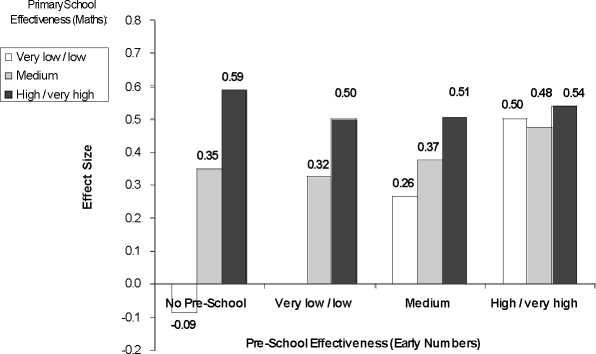numbers). It can be seen that the relative difference in ES of attending a low academic effective
primary compared with a high academic effective primary is 0.39.
Figure 3.11 indicates stronger effects for Mathematics and the pattern is clearer and more
consistent than that for Reading. Children who went to a high academic effective primary school
generally do well at Year 5 irrespective of their pre-school experience (ES 0.50-0.59). Children
who attended no pre-school, or a low or medium effective pre-school, benefit especially from the
academic effectiveness of the primary school in Mathematics. But children who had previously
attended a highly effective pre-school, show higher attainment (compared to children who stayed
at home and went to a low effective primary school) irrespective of the effectiveness of the
primary school. This again points to the protective effect of attending a highly effective pre-
school for later Mathematics outcomes at Year 5.
Figure 3.11: The combined impact of pre- and primary school effectiveness on attainment in
Mathematics at Year 5
The Combined Impact of Pre -School and
Primary School Effectiveness: Mathematics

Reference Group: No Pre -School and
Very low / low Primary School Effectiveness
Summary of Pre- and Primary School Influences
Our analyses tested the net impact of different aspects of pre- and primary school experience
while controlling for the influences of all other child, family and HLE background measures
simultaneously and thus, provides well controlled net estimates of the size and statistical
significance of any continuing pre-school effects as well as of primary school influence.
The results show that good pre-school experience (in terms of high quality and high
effectiveness) still makes a difference to children’s longer term cognitive attainments even after 5
years full time in primary school education. However, there is no evidence of continued benefits
related to just having attended a pre-school centre or not, or differences in later attainment
outcomes related to differences in months duration of time in pre-school. This is a change to
earlier findings reported at entry to primary school and in Year 1 (see Sammons et al., 2002;
2004a) where differences in outcomes were statistically significant especially in relation to
duration of pre-school.
The results also illustrate that the general level of academic effectiveness of the primary school
also matters for attainments in Reading and Mathematics at the end of Year 5. A high academic
effective primary school seems to be especially important for those children who did not go to
pre-school (the lowest attainments are identified for the ‘home’ group who went on to a low
25
More intriguing information
1. The name is absent2. Correlation Analysis of Financial Contagion: What One Should Know Before Running a Test
3. Rent Dissipation in Chartered Recreational Fishing: Inside the Black Box
4. Evaluating the Impact of Health Programmes
5. Artificial neural networks as models of stimulus control*
6. The name is absent
7. Education Responses to Climate Change and Quality: Two Parts of the Same Agenda?
8. The name is absent
9. Internationalization of Universities as Internationalization of Bildung
10. Modelling Transport in an Interregional General Equilibrium Model with Externalities